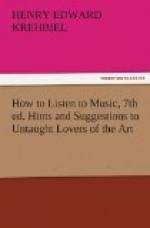[Sidenote: An Opera buffa.]
[Sidenote: French Grand Opera.]
[Sidenote: Opera comique.]
[Sidenote: "Mignon."]
[Sidenote: "Faust."]
It is well to remember that “Don Giovanni” is an Opera buffa when watching the buffooneries of Leporello, for that alone justifies them. The French have Grand Opera, in which everything is sung to orchestra accompaniment, there being neither spoken dialogue nor dry recitative, and Opera comique, in which the dialogue is spoken. The latter corresponds with the honorable German term Singspiel, and one will not go far astray if he associate both terms with the English operas of Wallace and Balfe, save that the French and Germans have generally been more deft in bridging over the chasm between speech and song than their British rivals. Opera comique has another characteristic, its denouement must be happy. Formerly the Theatre national de l’Opera-Comique in Paris was devoted exclusively to Opera comique as thus defined (it has since abolished the distinction and Grand Opera may be heard there now), and, therefore, when Ambroise Thomas brought forward his “Mignon,” Goethe’s story was found to be changed so that Mignon recovered and was married to Wilhelm Meister at the end. The Germans are seldom pleased with the transformations which their literary masterpieces are forced to undergo at the hands of French librettists. They still refuse to call Gounod’s “Faust” by that name; if you wish to hear it in Germany you must go to the theatre when “Margarethe” is performed. Naturally they fell indignantly afoul of “Mignon,” and to placate them we have a second finale, a denouement allemand, provided by the authors, in which Mignon dies as she ought.
[Sidenote: Grosse Oper.]
[Sidenote: Comic opera and operetta.]
[Sidenote: Opera bouffe.]
[Sidenote: Romantic operas.]
Of course the Grosse Oper of the Germans is the French Grand Opera and the English grand opera—but all the English terms are ambiguous, and everything that is done in Covent Garden in London or the Metropolitan Opera House in New York is set down as “grand opera,” just as the vilest imitations of the French vaudevilles or English farces with music are called “comic operas.” In its best estate, say in the delightful works of Gilbert and Sullivan, what is designated as comic opera ought to be called operetta, which is a piece in which the forms of grand opera are imitated, or travestied, the dialogue is spoken, and the purpose of the play is to satirize a popular folly. Only in method, agencies, and scope does such an operetta (the examples of Gilbert and Sullivan are in mind) differ from comedy in its best conception, as a dramatic composition which aims to “chastise manners




